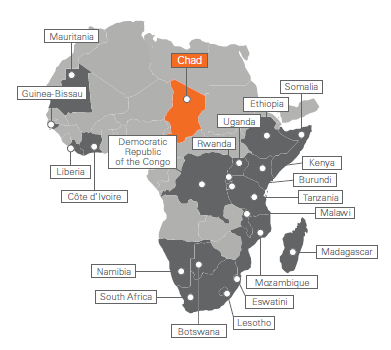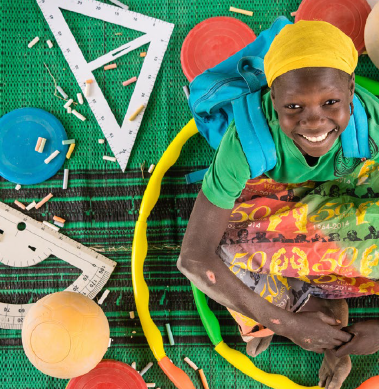Africa is on the move: the continent has some of the fastest-expanding economies in the world with a rapidly growing young population. Chad’s newly ratified 2017–2021 National Development Plan positions the country to achieve progress and economic growth. Children and adolescents have enormous skills, capacity and potential to transform their families, communities and even countries, contributing to regional and even continent-wide outcomes. As part of the plan, education partners convened to produce a sector-wide agreement – the Plan Intérimaire de l’Éducation du Tchad (PIET, 2018–2020) to address education challenges. The country also created a designated fund to support alphabetization and non-formal education. The World Bank, Global Partnership for Education and many other partners have made investment commitments toward Chad’s development. As a result, progress is happening: primary school gross enrolment generally increased over the past years, from 0.5 million in 2014 to 2.2 Million in 2016.
With the right government policies, investments and strong technical support, together we can ensure that Chad’s children and adolescents contribute to a national vision. Schools for Africa (SFA) is a global initiative which aims to achieve quality education across sub-Saharan Africa, ensuring that all children, including the most remote and marginalized children, are learning and gaining the skills to succeed in life and work. SFA convenes businesses, governments and individuals and has a proven track record in partnering with the private sector to achieve education results for children.
The challenges
Despite some primary school improvements, Chad faces significant obstacles that threaten education outcomes and progress toward the Sustainable Development Goals. The following challenges must be addressed:
- Primary school enrollment and attendance are inadequate – one out of five children (20 per cent of the population) does not go to primary school, and only one in three children complete primary education and continue into secondary. Distance from Schools and school fees keep children from pursuing their education;
- Quality of primary schools – existing primary schools are not particularly compelling – many lack infrastructure and are overcrowded and understaffed;
Quality of teaching – only 30 per cent of teachers are qualified. Over two thirds of primary school teachers are community teachers, who are meant to be paid through government grants that are frequently delayed
for years; when teachers aren’t compensated, there is absenteeism and departure; - Data availability – children are not registered at birth (only 12 per cent were registered in 2015), and insufficient data on and monitoring of highly vulnerable groups – children with disabilities and girls – makes it very difficult to appropriately budget for and meet the needs of these populations;
- Child protection and abuse – children experience high levels of abuse and violence: in 2015, 77 per cent of children said they experienced physical violence at home;
- Learning for girls – nearly 80 per cent of girls aged 15 years and above are illiterate. Only one in ten girls complete basic education;
- Overburdened education facilities – the country faces overlapping crises, due to instability, violence, insecurity and economic recession. Chad is home to over 400,000 refugees from Sudan, CAR and Nigeria and approximately 71,000 Chadian returnees from CAR; this situation stresses both the education and health systems. In addition, over 100,000 Chadians are internally displaced; more than half of this population comprises school-aged children between 3 and
17 years, who experience disrupted learning during periods of mobility.


